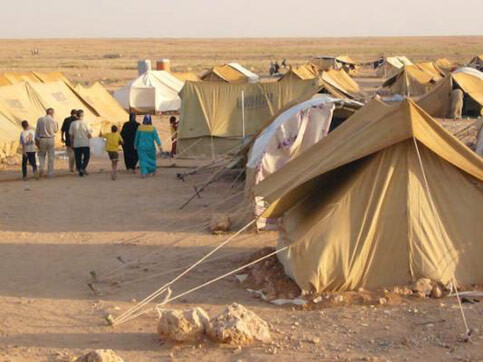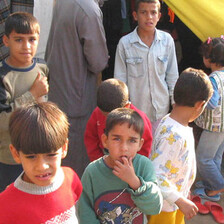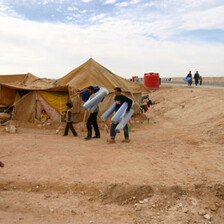The Electronic Intifada 21 March 2008

Al-Waleed refugee camp. (MAP)
In 2006, as Iraq descended into new depths of civil conflict, 350 Palestinian refugees were driven out of Baghdad by targeted violence. They arrived in the desert no man’s land between the Iraqi and Syrian border crossings at al-Tanf. The Syrian authorities denied the Palestinians access into Syria, while also preventing any more Palestinians arriving into the no man’s land. The worsening violence in Iraq, however, saw the continuing arrival of Palestinian refugees at the border. An estimated 1,740 refugees are now stuck in al-Waleed camp on the Iraqi side. In addition, towards the end of 2007 about 350 Palestinians who previously entered Syria with Iraqi passports were relocated to al-Tanf camp. The number of refugees in al-Tanf has now increased to an estimated 720, 500 of whom are women and children.
For many of the refugees, the trigger for their attempt to leave Iraq was the extreme violence they had suffered. Bereft of a militia to protect their minority status, middle class Palestinians have been frequent targets of brutal kidnapping and ransom attempts. Tisar Abdel Fadi, a forty-year old mother of three, left Baghdad for al-Tanf following her husband’s kidnapping. Taken from a hospital, he was subsequently tortured and killed.
For these vulnerable refugees, it was a case of leaving the frying pan of Baghdad only to find the fire of the barren desert camps. The refugees in the al-Waleed camp in particular are subject to fluctuating politics of local and regional sheikhs in the lawless Anbar province. These local authorities try to secure a share of the aid business and intervene according to their own interests. This makes the work of the international aid organizations extremely difficult as they are regularly hindered in carrying out their jobs effectively. Security is so poor that overnight visits are not possible. The camp is also subject to interference from the border police, local police and the Iraqi army.
Both camps are characterized by tented accommodation[s] due to the fear that more solid structures would encourage permanent settlement in what constitutes the most peripheral and unforgiving of locations. Given the harsh weather conditions — the freezing cold in winter, the unbearable desert heat in summer — and the regular threats from fires, snakes and scorpions, long-term dwelling in a tented settlement is simply not a viable solution.
In al-Waleed, the refugees have installed toilets in their tents, but the ground does not allow for the absorption of the waste water. This forces the sewage to run openly through the camp, leading to a higher incidence of disease and infections as children play between the tents. The medical requirements of these refugees are numerous; they include the need for an additional female doctor, as well as more frequent visits from the gynecologist. There is also a need for a psychologist, trauma counsellors, a dentist, nurses and a proper medical health center in the camp. In addition, the only activities available in the camp are basic schooling for the children and embroidery work for women, condemning the vast majority of refugees to indolence.
Medical Aid for Palestinians (MAP) took an Iraqi doctor and refugee in Damascus, to visit the camp. The doctor noted that the most serious medical conditions were clearly linked to the negative effects on the mental health of the refugees caused by a pervasive sense of the hopelessness for their situation and the difficulties of the environment.
Indeed the main problems faced by the Palestinian refugees currently living along the border are the unbearable physical conditions and their uncertain future. There is an urgent and seldom recognized need for these refugees to be resettled as soon as possible. It is also their explicit wish not to be brought to any other Arab country but to another country, which gives them permanent living status.
In August 2007, UN Goodwill Ambassador Angelina Jolie visited al-Waleed and told the press afterward that, “it is absolutely essential that the ongoing debate about Iraq’s future includes plans for addressing the enormous humanitarian consequences these people face.” Yet almost half a year on, little has changed, the situation remains as desperate as ever for Palestinians stuck in this barren and unforgiving no man’s land.
James Denselow is the communications officer for Medical Aid for Palestinians a UK-based charity that works for the health of Palestinians — especially in conditions of occupation, displacement or exile — based on principles of self-determination and social justice.


